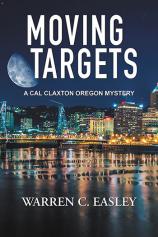Author Talk: September 19, 2018
When a young woman walks into Caffeine Central, Cal Claxton's law office in downtown Portland, he has no idea that agreeing to help her will turn his life upside down. That’s the intriguing premise of MOVING TARGETS, the sixth installment in Warren C. Easley’s mystery series starring the former Los Angeles prosecutor turned small-town lawyer. In this interview, Easley talks about his approach to using topical themes in his fiction, his decision to make Oregon an essential element in the series (a main character, if you will), the most important thing he’s learned about writing crime novels, and his reaction to his fifth book, BLOOD FOR WINE, being nominated for the prestigious Nero Award.
Question: Having now reached the sixth book in your Cal Claxton series, what’s the single most important thing you've learned about writing crime novels?
Warren C. Easley: Wow, that's a tough question! I've learned so many important things through the course of the series. For example, from Barbara Peters, my editor, I learned the importance of tying up every loose end in the story. For a reader, loose ends are like a sliver under a nail! I’ve also learned how smart my readers are --- if I describe an Oregon setting, I’d better get it right, and if I mention a weapon, I’d better know its specifications. If I had to pick one thing, I'd say it's the importance of keeping it real. There's a natural tension between the need to heighten drama and conflict and the need to keep the plot believable. I always of think of Tippi Hedren in Hitchcock's The Birds when she walks into an attic full of squawking seagulls. Okay, it was dramatic, but how dumb can you get, Alfred? So I'm always aware of that tricky balance. Go for the drama, but keep it real.
Q: MOVING TARGETS features both a Portland real estate scam and the well-disguised machinations of the Russian mob. Can't be much more topical than that! What’s your approach to using topical themes in the Claxton series?
WCE: These are divisive times, so it’s no surprise that some mystery writers choose to paint their stories on a more or less neutral canvas for fear of alienating part of their readership. I’ve chosen to embrace topical themes and use them to provide a realistic backdrop and motivation for the crimes Cal gets confronted with. For example, in my fourth book, NEVER LOOK DOWN, Cal uncovers an illegal operation involved in proliferating assault rifles modified to make them fully automatic. This was two years before the Las Vegas shooting, but the bump stock technology was already out there on the internet. In MOVING TARGETS, the gentrification of Cal’s beloved Portland becomes a driver in the plot. Longtime residents are being driven from their homes, which are being torn down and replaced with expensive condos and high-rises. If there’s big money to be made, greed and treachery are just around the corner, as Cal quickly finds out.
Q: MOVING TARGETS is set almost exclusively in Portland, a city hailed as one of the most desirable metro areas to live in today in America. What’s your approach to setting, and how does that play out in the series?
WCE: I love Oregon and wanted it to be an essential element in the series --- a main character. Cal lives 25 miles south of Portland in the Oregon wine country, where he has a one-man law practice. But he also has a part-time pro bono practice in Portland. I set up this duality, so I could move from stories set in the city to stories set in rural Oregon. Wherever I place him, I’m always focused on his surroundings, from towering Douglas firs in his backyard to the Willamette River that cleaves the city in half. My wife says my books are love letters to Oregon. That’s true.
Q: A consistent theme running through the critical reaction to your series is that Cal Claxton is a very likable protagonist, the kind a reader can root for. What is your approach to his character development?
WCE: Like Mosley’s Easy Rawlins and Connelly’s Bosch, I wanted Cal to be an everyman, the kind that the reader can identify with. That sets up the dynamic I’m most interested in: How does an ordinary guy react when confronted with extraordinary situations? Once a hard-charging L.A. prosecutor, the suicide of his wife caused him to recalibrate. Now he’s drawn to the defense of the little guy, the person caught in the gears of an unforgiving culture. I knock him down a lot, but his greatest virtue is that he gets back up. And he loves his dog Archie almost as much as his only daughter, Claire.
Q: Your fifth book, BLOOD FOR WINE, was just nominated as one of five books vying for a coveted Nero Award. How does that nomination make you feel?
WCE: What an honor! Writing for a small press makes it difficult to gain national recognition, so I’m thrilled just to be shortlisted for an award that writers like Mosley, Connelly, Penny and Block have won. The competition looks fierce, so I’m not holding my breath. There’s an ironic aside to this. When I started my series, as a wink and a nod to Rex Stout, I decided to call Cal’s dog “Archie” after Nero Wolfe’s sidekick. Who knew?




